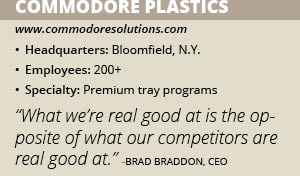Commodore Plastics
It’s unlikely that the average supermarket shopper pays much attention to the trays that their food is packaged on, but food processors certainly do. The average shopper might think all trays are made equal, but the truth is that processors often need trays made to very specific requirements, and sourcing those trays requires a manufacturer that is sensitive to their needs. That’s what has made New York-based Commodore Plastics a leader in the industry according to CEO Brad Braddon – the ability to manufacture trays that don’t adhere to a one-size-fits-all approach.
The company was founded in 1981 by Braddon’s father, a former engineer at Mobil who saw a lot of untapped potential in the foam tray segment. Braddon’s father developed a style of machinery and tooling that could produce smaller runs of niche products to serve very specific needs in the marketplace. Braddon says this approach has enabled Commodore Plastics to exist as a relatively small player in a very large market. Today, the company serves a broad cross-section of food processors, and Braddon says, “Commodore Plastics’ trays frequently are used in applications involving automated equipment.”
Thanks to the company’s focus on product safety using the British Retailer Consortium (BRC) guidelines , Commodore Plastics has become a major player in the segment and a valued partner for numerous major food processors. Unlike many of its competitors, Braddon says, “Commodore Plastics can deliver exactly what its customers need by providing a complete solution for their tray needs.” The biggest advantage Commodore Plastics brings to its customers is its ability to deliver something different than the typical tray. While the rest of the industry is focused on delivering huge quantities of the exact same type of product, Commodore Plastics is more interested in helping solve its customers’ problems.
 “What we’re real good at is the opposite of what our competitors are real good at,” Braddon says. “Our competition is really good at high volumes of lots and lots of the same, and I would say the competition isn’t really good at customization, so if a particular tray doesn’t work well they’re not real good at changing that tray so it will work.”
“What we’re real good at is the opposite of what our competitors are real good at,” Braddon says. “Our competition is really good at high volumes of lots and lots of the same, and I would say the competition isn’t really good at customization, so if a particular tray doesn’t work well they’re not real good at changing that tray so it will work.”
Commodore Plastics, on the other hand, is capable of developing premium tray programs for customers made specifically for their particular applications. “Our advantage is that we provide solutions to the problems that you see in merchandising with product fit, and we solve the problems that companies have from an operational basis,” Braddon says. “Our strength is in getting the color right, and getting the size right, if the customer needs a custom size we will manufacture the tooling right here in our technology division. “
Braddon emphasizes that it’s Commodore’s manufacturing approach that gives it the efficiency to deliver such a degree of customization for its customers. “It really comes from having developed our own unique manufacturing footprint that’s different from our competitors’,” he says. “We don’t buy our equipment from anyone; we build it ourselves.”
Changing Market
The degree of flexibility Commodore Plastics brings to the marketplace is crucial for the company’s continued success in light of the way the industry is changing. According to Braddon, food processors today are looking for greater diversity in foam trays for various applications, specifically when it comes to colors and sizes. “One of the biggest challenges today is that the number of different tray requirements is increasing,” he says. At the same time, food processors continue to raise the bar in terms of food safety in their processes, increasing the pressure on manufacturers such as Commodore Plastics to meet more stringent requirements. Braddon says the company’s BRC Packaging certification demonstrates its commitment to adhering to the highest food safety standards.
Along with the challenges from within the industry, Braddon says Commodore Plastics continues to work against the misconceptions some people have about foam. He says many people don’t understand that polystyrene doesn’t involve hazardous chemicals and can be recycled, making it more eco-friendly than materials from the past. Foaming any packaging material is good for the environment.
Despite the challenges, Braddon says Commodore Plastics is focused on continued success in the near future. He says the company’s unique ability to solve problems for its customers makes it a trusted partner with numerous food processors, and as long as food processors have packaging problems to solve, Commodore Plastics will continue to be there with solutions.